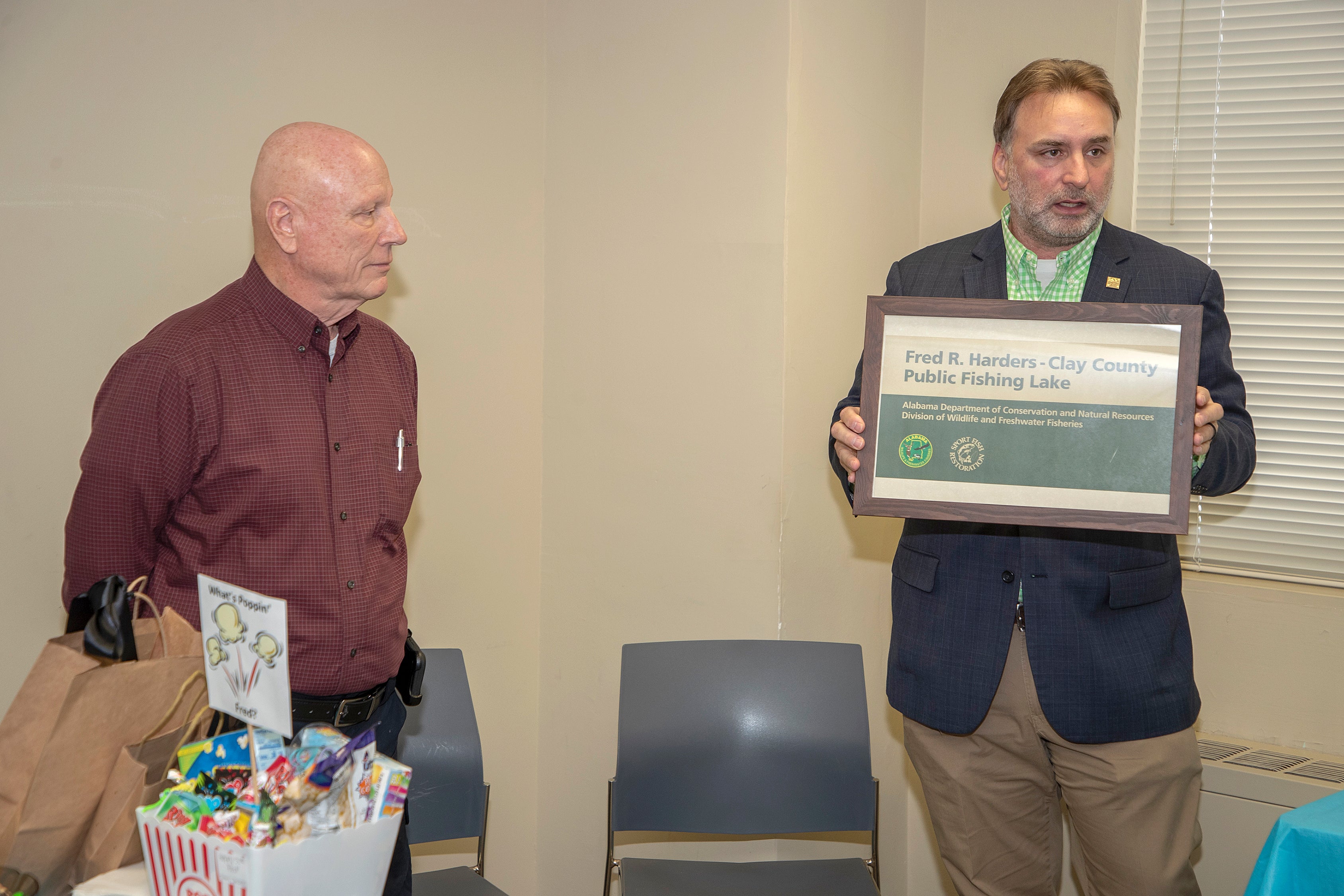By DAVID RAINER, Alabama Department of Conservation and Natural Resources
Since the mid-1970s, one thing has remained constant at the Alabama Department of Conservation and Natural Resources (ADCNR): Fred Harders is hard at work in the Wildlife and Freshwater Fisheries (WFF) Division.
Harders was recently celebrated for 50 years of service to the State of Alabama, 48 of those with WFF in one capacity or another, the last 24 years as WFF’s Assistant Director. And the Chicago native has no plans to stop anytime soon.
After getting his undergraduate degree in Minnesota, Harders had a choice to further his education.
“When I got out of undergraduate school, there were two places that a fisheries biologist could go,” said Harders, who grew up fishing lakes in Minnesota and the Great Lakes. “One was a coldwater salmon and trout school at the University of Washington. And the warm-water fisheries school was at Auburn. I was interested in warm water, so I came down here. That’s where it started.
“That was quite a culture shock when I first got here. The first summer, I didn’t think I was going to live it was so hot.”
After graduating from Auburn, he spent a short time in another state agency that did not utilize his fisheries degree.
When a position came open in WFF in 1976, Harders quickly took the job in District II, headquartered in Eastaboga. He worked the Coosa River and several state public fishing lakes. He said the staff and equipment were bare bones at the time.
“Back in the day, we couldn’t buy anything,” Harders said. “We had to work with stuff that was older. My first state vehicle was an old Rambler station wagon. My supervisor at the time didn’t tell me that when you got to about 60 miles per hour that the hood would pop. It wouldn’t come all the way up, but it would pop. He just looked and laughed.
“We did a lot of work on redeye bass. We had a backpack shocker that broke down every trip. It’s nothing like they have today. Electrofishing boats were nothing like they are today. We had modified john boats. The generators we used were old and very heavy. It’s a lot different now, but we got the job done.”
In 1980, Harders’ late wife, Sharron, gave birth to triplet boys, which Harders said made their lives significantly more complicated.
“Anybody who has twins, you can make it,” he said. “With triplets, you better get help. We used to take turns feeding and trying to sleep. We had a schedule to write down who ate what and when, but we just couldn’t keep up with it.”
In 1982, Harders loaded up the family and moved to Montgomery as the Public Fishing Lakes Supervisor, which included overseeing the 23 public fishing lakes that were designed to give those in rural areas access to the recreational opportunities and sustenance needed in those areas.
“The State Public Fishing Lakes were constructed in rural areas where they didn’t have fishing for a source of protein,” he said. “That’s how that program got started.”
In 1986, Harders was promoted to the Assistant Chief of Fisheries position and then to Chief of Fisheries in 1989. He said by the time he became Chief, the opportunities had expanded.
“I used to go to different meetings around the country with different fisheries folks to find out what was the latest and greatest, and then come back and try to implement some of that in Alabama,” he said. “That was the time everybody was looking at black bass populations and length limits, and what the shad population had to do with black bass populations. We worked a lot with Auburn, and they gave us a lot of good information on how to sample reservoirs and how many bass we needed to collect. That research was very helpful.
“Back then, we had a stocking program for striped bass and hybrids that was going quite well.”
In 2000, then WFF Director Corky Pugh insisted Harders become the WFF Assistant Director.
“Fred is the ideal Assistant Director for the Wildlife and Freshwater Fisheries Division,” Pugh said. “He brought a technical background to that job. I got the chance to promote him to Assistant Director against his will. He was Fisheries Chief. I’m an administrative guy, that’s my background and education. I wanted somebody on the biological side, and Fred brought that scientific perspective to the office.
“The personal characteristics that made him so well-suited for the job were his backbone, no self-serving agenda and total reliability. I never worried about Fred handling a program and handling it right.”








